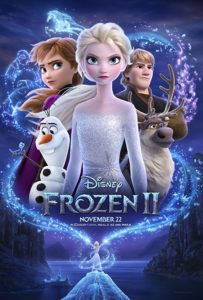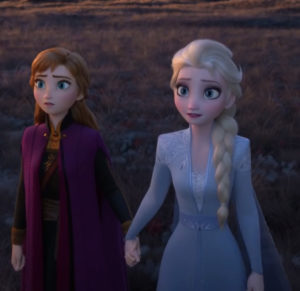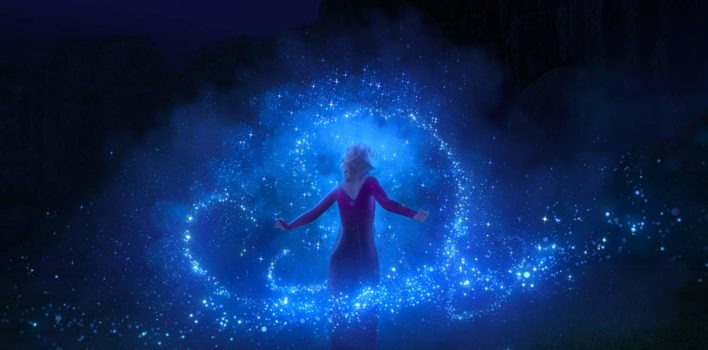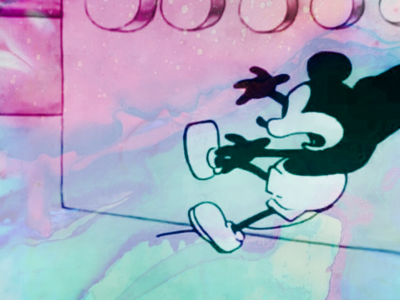Frozen II and the Inescapable Story of Redemption
 Frozen II is quite honestly an amazing sequel, as far as sequels go. The animation is gorgeous, the musical sequences are entertaining and thought provoking, and the messages of trust, family solidarity, and real loyalty are all delivered.
Frozen II is quite honestly an amazing sequel, as far as sequels go. The animation is gorgeous, the musical sequences are entertaining and thought provoking, and the messages of trust, family solidarity, and real loyalty are all delivered.
Through the jokes and stunning visuals, the fun music and lively story, I couldn’t help but notice what I’ll call “the inescapable story of redemption”.
I’ll try to avoid real spoilers, but if you haven’t seen this film yet, you might want to read this afterwards. It’s worth seeing.
As with most Disney movies, I tried to go into Frozen II with an awareness that there is always more to the themes of the film than meets the eye. Every great Disney movie, it seems, has always had a very clear message of sacrifice and redemption in some form or another. From Cinderella to Star Wars, it’s not hard to find the themes of unconditional love, sacrificial death or loss, and a hero or heroine being brought back from destruction. It’s almost a must for any type of direct storytelling to include some sort of “death” followed by a “resurrection” to win the day. Frozen II, a widely anticipated sequel to the runaway hit starring the lovable and indomitable Elsa and Anna, is no different. The apparent themes include life changes, growing up, loyalty, and the trials that come with love and family dynamics. These are easy to digest and understand for both young ones and adults. But what might not be as obvious are the undeniable parallels between the story of these sisters and the story of the gospel of Jesus Christ.
God is in everything, so why not in this beloved children’s tale?
The Voice of the Spirit
“Jesus answered, ‘Truly, truly, I say to you, unless one is born of water and the Spirit, he cannot enter the kingdom of God.
That which is born of the flesh is flesh, and that which is born of the Spirit is spirit… The wind blows where it wishes, and you hear its sound, but you do not know where it comes from or where it goes. So it is with everyone who is born of the Spirit.’”
—John 3:5-6 & 8
 The voice Elsa experiences in Frozen II moves like the Holy Spirit moves and parallels the Spirit’s activity. Elsa heard the call of the voice singing to her when no one else did. She wasn’t longing or listening for a purpose or an adventure to take her away from her home. She didn’t approach the voice on her own. She even resisted for a time, trying to ignore the song that she knew was calling her away from Arendelle. This voice is so similar to the Holy Spirit, the third person of the Trinity, that in my opinion it’s almost impossible to argue that it’s accidental. The themes in this movie, just like the themes present in every story of sacrifice, redemption, and love are all themes presented in the Bible and apparent in any good story. The voice that Elsa hears calling her to the magical forest is the same type of voice every believer hears when they first believe.
The voice Elsa experiences in Frozen II moves like the Holy Spirit moves and parallels the Spirit’s activity. Elsa heard the call of the voice singing to her when no one else did. She wasn’t longing or listening for a purpose or an adventure to take her away from her home. She didn’t approach the voice on her own. She even resisted for a time, trying to ignore the song that she knew was calling her away from Arendelle. This voice is so similar to the Holy Spirit, the third person of the Trinity, that in my opinion it’s almost impossible to argue that it’s accidental. The themes in this movie, just like the themes present in every story of sacrifice, redemption, and love are all themes presented in the Bible and apparent in any good story. The voice that Elsa hears calling her to the magical forest is the same type of voice every believer hears when they first believe.
Let me explain why, and why it matters.
First of all, the Bible is clear that the Spirit chooses whoever He chooses, with no qualifiers. The apostle Paul says without hesitation that the Holy Spirit is powerful and appoints Christians to different parts of “the body” of Christ:
“All these are empowered by one and the same Spirit, who apportions to each one individually as he wills.”
—1 Corinthians 12:11.
Just as the voice called Elsa, mysteriously yet unmistakably specific, so the Spirit has called believers since the beginning of history. God by the Spirit also demonstrated His power through signs and wonders (Hebrews 2:4), and has called all those He chooses on earth from the time of Abraham to today. The Spirit is also freely traveling from heaven to earth, unlike the other members of the Godhead (Jesus doesn’t come down to earth bodily for the Lord’s Supper). The Spirit hears the prayers and groans of Christians (Romans 8:26) and intercedes with God the Father. While we don’t see all of this from the voice in Frozen II, it’s implied that the voice has the power to call Elsa and help her find her way to the truth about her family and about her kingdom. We’ll look in depth at the journey Elsa takes more later on, but for now just know that the voice is more like the Holy Spirit than not; and the Holy Spirit calls Christians on a real adventure (let me tell you what). So Elsa begins her journey to the forest because of the voice, and starts the story of Frozen II.
A Journey through Darkness and Mist
 Once the group reaches the edge of the Enchanted Forest, a thick and overwhelming mist seems to be blocking the entrance into the woods. It seems as though the journey might end here, since Elsa, Olaf and Kristoff are unable to penetrate the magical mist. Then Elsa touches the mist and yields to her so that the group can enter. It’s a short sequence, and is easy to forget once the story takes off afterwards. Yet, the symbolism here, as with the singing voice, is significant.
Once the group reaches the edge of the Enchanted Forest, a thick and overwhelming mist seems to be blocking the entrance into the woods. It seems as though the journey might end here, since Elsa, Olaf and Kristoff are unable to penetrate the magical mist. Then Elsa touches the mist and yields to her so that the group can enter. It’s a short sequence, and is easy to forget once the story takes off afterwards. Yet, the symbolism here, as with the singing voice, is significant.
Like the Biblical account of God saving His people at the Red Sea through Moses, the mist and its apparent impassibility echo Jesus’ salvation and the Kingdom of Heaven. Jesus says many different times in the gospels that most humans will not be allowed to enter the Kingdom of Heaven, and that the Spirit of God opens the eyes of believers. The concept of ‘mist’ itself is associated with blindness in Acts 13:11, where Saul is blinded by the Lord. So, not being able to perceive the Lord, being excluded because of a barrier, or being blind spiritually are all associated in the word of God with a type of mist or fog. As Elsa is the only one hearing the voice calling her, so she is also the only one able to perceive, to pierce the veil, to get to where she was being called.
The veil of the temple in Israel was a type of physical barrier blocking the holy of holies. While not incredibly similar to mist, the curtain blocking the innermost chamber of the temple was a type of supernatural wall protecting mere humans from the power and danger of the holy. Only those who were considered worthy and pure could enter this area and survive. No one, except those who were allowed, could have access, and thereby have access to God himself. While this comparison might seem like a far reach, the idea of a veil blocking the hero from the truth is an ancient and deep theme. And like Elsa, Jesus was not only able to pass through it, He tore it so that we could enter, too.
When Elsa faces the violent and unyielding ocean, we again see a parallel to Moses during the Exodus from Egypt. The faithless Israelites fear that the massive size and power of the sea is impossible to conquer. Moses, empowered by God, parts the seas and allows his people to pass through the waters safely. The significance of the sea and its submission to the power of God has been a theme of ancient poetry and other writings to represent God and His vastly infinite power. Psalm 89, for example, explains the power of God over this force of nature:
“O LORD God of hosts, who is mighty as you are, O LORD, with your faithfulness all around you?
You rule the raging of the sea; when its waves rise, you still them.”
—Psalm 89:8-9
 This passage connects perfectly to the famous story in the Gospels of Jesus Christ calming the storm. Again, this might seem like a stretch, but it’s very apparent in the film just how similar the powers Elsa exercises are to the biblical account of Christ. When she arrives at the shore of the sea, she knows that she can and must cross these waters. As she fights to subdue the power of the water, represented by an icy horse, she not only makes her way across the water, she actually conquers this power and harnesses the spirit of the water in order to cross the sea safely. Pointing back to the Bible, it’s easy to see how Jesus displays His power in ways that are not only similar, but go far beyond anything mere fiction could communicate. In much of ancient literature the sea is a metaphorical representation of chaos or danger, causing mortals to fear for their lives; for some, the god of the sea is a personality of power and tempestuous rage. Even in the New Testament of the Bible, the book of Revelation promises that the new heavens and the new earth will have no sea, communicating the end of all chaos and danger.
This passage connects perfectly to the famous story in the Gospels of Jesus Christ calming the storm. Again, this might seem like a stretch, but it’s very apparent in the film just how similar the powers Elsa exercises are to the biblical account of Christ. When she arrives at the shore of the sea, she knows that she can and must cross these waters. As she fights to subdue the power of the water, represented by an icy horse, she not only makes her way across the water, she actually conquers this power and harnesses the spirit of the water in order to cross the sea safely. Pointing back to the Bible, it’s easy to see how Jesus displays His power in ways that are not only similar, but go far beyond anything mere fiction could communicate. In much of ancient literature the sea is a metaphorical representation of chaos or danger, causing mortals to fear for their lives; for some, the god of the sea is a personality of power and tempestuous rage. Even in the New Testament of the Bible, the book of Revelation promises that the new heavens and the new earth will have no sea, communicating the end of all chaos and danger.
Elsa subdues and even harnesses the power of the sea, a violent and powerful force. She does it by herself, even going so far as to push her own sister away, refusing to put Anna into more danger; she is separated from her loved ones and alone in her suffering like Jesus was. The sea bows to her command, and she controls part of it.
This sequence could be compared to the story of Jesus calming the stormy sea in the gospels, with some very key differences. Elsa has to fight and conquer the waters by force, failing at first. Jesus had only to raise His voice, and the sea immediately calmed. He wasn’t out to conquer a powerful force by fighting. He was commanding nature by His word, a divine right He has because of His authority and divinity as creator. Jesus had no need to use magic or brute force to compete with nature. He was completely in charge of it at all times.
 And in the climax of the movie, Elsa has no choice but to sacrifice herself to communicate the message of the truth to those she loves. Maybe this is where the parallels cease, but just imagine this story without the sacrifice. In fact, imagine any story that hinges on such a powerful plot point- that is, the main protagonist sacrificing what they love dearly- and take this climactic act out of the story. Is it still powerful? Maybe. Is it still memorable? Perhaps it still is somewhat. But the emotional and personal impact of a story often find root and consummation in an incredible act of personal sacrifice. Why do you suppose that is? My answer is simple; it’s because the greatest story ever told, a true story of infinite wonder and love, makes a perfect blueprint for any great tale. Jesus lived, died, and rose again to save people He loves. This framework of a story has been repeated for millennia, and will continue to be until He finishes His story with humanity once and for all.
And in the climax of the movie, Elsa has no choice but to sacrifice herself to communicate the message of the truth to those she loves. Maybe this is where the parallels cease, but just imagine this story without the sacrifice. In fact, imagine any story that hinges on such a powerful plot point- that is, the main protagonist sacrificing what they love dearly- and take this climactic act out of the story. Is it still powerful? Maybe. Is it still memorable? Perhaps it still is somewhat. But the emotional and personal impact of a story often find root and consummation in an incredible act of personal sacrifice. Why do you suppose that is? My answer is simple; it’s because the greatest story ever told, a true story of infinite wonder and love, makes a perfect blueprint for any great tale. Jesus lived, died, and rose again to save people He loves. This framework of a story has been repeated for millennia, and will continue to be until He finishes His story with humanity once and for all.
I love encouraging others to pay attention to and notice these themes in popular culture that are so familiar yet so refreshing to us. God can never be fully separated from any story, any expression of reality, or any thought process. He inhabits everything humans create, even if it’s not readily obvious, because His hand is upon His creation. Jesus used storytelling as a touchstone of His earthly ministry, and the stories that we tell one another will never escape the influence of that great and awesome cosmic story, the story of redemption.







